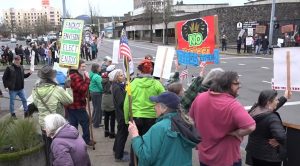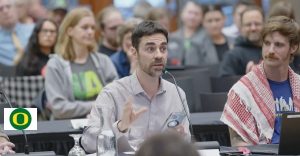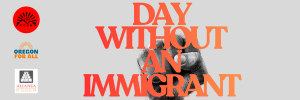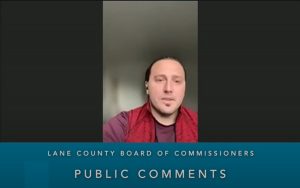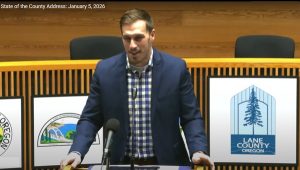Sass explains STAR voting; sign up to learn more
9 min read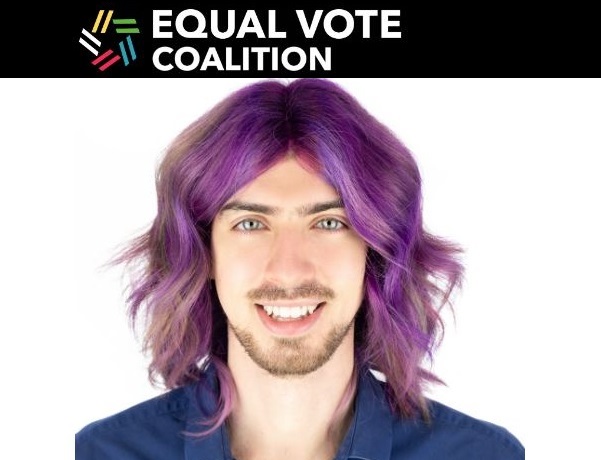
Rob Tobias (Train of Thought, KEPW 97.3): My name is Rob Tobias. And my guest in the studio is Hayden Sasswood, who is deputy director of STAR voting.
[00:00:08] Hayden “Sass” Sasswood (Equal Vote Coalition): Yeah, STAR voting is really simple. So, instead of only being able to support one candidate when you go to vote, with STAR voting, you get to score candidates from zero up to five stars.
[00:00:20] Rob Tobias: What’s wrong with the way we vote right now?
[00:00:22] Sass: Yeah, that’s a great question. So, let’s imagine an election with Luke Skywalker and Darth Vader. Those are your two candidates. Yeah. 60% vote for Luke, 40% vote for Darth. Luke wins. Great.
[00:00:33] But when you throw in a third candidate, everything breaks. So let’s say this third candidate now that we’re adding in is Leia Organa, General Leia, Princess Leia, whichever trilogy you prefer. Well, most voters who like Luke also like Leia, most voters who like Leia also like Luke, but when they go to vote, they can’t show that support for both candidates, they’re only allowed to support one on their ballot.
[00:01:00] And so what happens is this 60% of voters who like both, they end up splitting their votes between the two, and then they both end up with less than 40%, while Darth Vader hangs on to his 40%, and then Darth Vader wins.
[00:01:14] So now you’ve actually lost voting power just because there were more good guys running on your side.
[00:01:21] And the only reason that that can happen is because we’re using a poorly-engineered system. If we used a better-engineered system, that wouldn’t be a concern at all. It’s not a vice of the voters or a crime of the candidates—it’s the math of the method.
[00:01:34] Rob Tobias: Right? And so that’s partly why we’re here today is to try to educate people—because there’s an initiative on the ballot, correct?
[00:01:41] Sass: So locally in Eugene, there is a measure on the ballot this May, 20-349, it rolls right off the tongue, just for Eugene City Elections. So that’s mayor, city council, and EWEB.
[00:01:54] We are also collecting signatures on a statewide petition to try to get it on the statewide ballot in November. That signature collection is ongoing, but we’re already on the ballot locally in Eugene.
[00:02:04] This is a modern proposal that’s built on centuries of voting science and a recent renaissance in voting science. And it’s really designed specifically so that your best outcome for yourself is going to happen if you just vote your conscience.
[00:02:21] And the design of the ballot empowers you to do that, because you get to freely support all the candidates you like, at a level from zero up to five stars. It’s both familiar and what we call ‘within the limits of cognitive load.’ It’s not an overwhelming number of options to score somebody. It’s a really good middle ground.
[00:02:42] Rob Tobias: Score Then Automatic Runoff (STAR): We’re not talking about a whole ‘nother election when you say automatic runoff?
[00:02:48] Sass: We mean automatic, yeah. So, because STAR voting eliminates vote splitting altogether, and because it’s so expressive, you can have as many candidates as you want in an election, and it will still work really well. It’ll still pick a really great winner. And so you don’t need to have multiple rounds, multiple separate elections.
[00:03:09] Right now we do this thing for our local nonpartisan elections where all the nonpartisan candidates run on the same ballot in May, and then if someone gets over 50%, then they are the only candidate on the ballot in November. And if nobody does in that race, then two candidates go on. And so there’s sort of a second election, sort of not. It’s not predictable. It really can be decided by this low-turnout primary in May.
[00:03:37] And what we’re saying is: That’s too complicated, it’s too much, we don’t need all this, especially because we don’t have a bajillion candidates running anyway. We don’t need to reduce the pool of candidates.
[00:03:47] This measure compresses that all into a single election and that happens in November. And so our city elections, if we adopt this measure, will happen in November, just one time. We’re not going to have this kind of split thing between May and November…
[00:04:00] STAR voting is a modern proposal. It was actually invented in Eugene at a conference at the University of Oregon about a decade ago. Voting experts from around the world got together and they were trying to figure out: What proposals should we push forward with?
[00:04:15] And they looked at all the ones on the table and they’re like, ‘None of them really check all of the boxes.’ And then almost accidentally, STAR voting was created. And there was years of research and study into it and scrutiny and it just kept holding up and doing really well.
[00:04:31] And so, that’s inspired this movement, and the acceleration of the popularity of STAR voting has been astounding. We’ve had political parties in other countries inquire with us about it. We have chapters all over the country. And just in the U.S., we have chapters that are saying, ‘We’re ready to do our own initiative, but you’ve got to get it done in Eugene first. You have to lead the way.’
[00:04:52] And Eugene’s really the perfect place because Eugene and Oregon has been such a leader in electoral reform of so many kinds and so many innovations. It’s really the perfect place to do STAR voting first, and we’re really excited to lead on this issue. The moment we pass it in Eugene, it’s just going to launch and it’s just going to explode so fast. And I’m just, I’m super-super excited about it.
[00:05:15] Rob Tobias: Have you looked at other things about elections? There’s a lot of things that could make elections better, I believe: why debates aren’t mandatory; or why there aren’t websites where every candidate has to present policy that can be fact-checked.
[00:05:33] Sass: We want to stay pretty mission-focused (Yeah) on making sure that every voter has an equal amount of power in every election, that’s really our mission. But, yeah, there are absolutely other aspects: when you talk about campaign finance reform; or you talk about gerrymandering (or districting really is the broader term for that); when you talk about things like proportional representation; and by talking about proxy voting and sortition—like, I can name things that you’ve not even heard of that are these really incredible innovations.
[00:06:02] But when I look at the landscape of the United States right now, and what the American palate is ready for, and what we can accomplish both legally and politically, focusing on this particular thing—voting method reform—is, I think, the best use of our time. It’s going to give us the biggest impact in the shortest amount of time, in this moment.
[00:06:23] So we’re huge on the voter education, that’s absolutely critical. We’ve got a big lawn sign drive right now where we’re, you know, just people seeing the lawn sign: ‘Oh, STAR voting. What’s that? I’ve seen 100 signs for those. It says there’s a measure number on there. I should look into this. I should get prepared.’
[00:06:39] But the biggest things that we have coming up right now are we’re partnered with the local League of Women Voters and the local libraries to do, we have three educational events, coming up at each of the library branches.
[00:06:51] And so I would really encourage everybody to sign up for our email list at STARVoting.org/join so you can learn about those as they come up, or you can also go to our events page as well and see them. We’re going to do presentations to neighborhood associations and other groups and organizations and businesses. I mean, we just want to get out there and educate.
[00:07:11] Rob Tobias: And I’m curious about opposition. I mean, I would imagine maybe you’ve gotten pushback from the parties because wouldn’t this be considered a threat to a two-party system?
[00:07:23] Sass: In our local measure, we are not changing the partisan structure of our electoral system, because those are nonpartisan races anyway—
[00:07:31] Rob Tobias: You may not be doing that, but in itself, STAR voting allows other candidates—possibly less-funded candidates—to be on the ballot and get considered alongside these party candidates.
[00:07:45] Sass: Yes, it reduces the influence of money in politics, and we’ve been starting to find ways to measure that really powerfully with doing polls during real elections. There was a fantastic volunteer who did a big poll in a recent Chicago mayoral election, great study on that. Sam Hyson is his name, he’s got some great Medium articles on it.
[00:08:03] He had Chicago voters vote using four different voting methods and then compared those results to the amount of money that these candidates had and drawing comparisons and seeing that approval voting and especially STAR voting almost completely eliminated any bias with money. Like, it just had really no effect.
[00:08:25] Which is really cool to see that. It makes it so that candidates who don’t have deep pocketbooks or can’t get the biggest funders on board still can get really great support and show up in an election and actually have a chance to win.
[00:08:37] So, in STAR voting, you score candidates zero up to five. So, you give your favorites five stars, your last choice is zero stars, you score other candidates as desired, you can even give multiple candidates the same score if you want, and then to tally it is just addition.
[00:08:55] The two candidates with the most stars overall are finalists, and then your one full vote automatically goes to the finalist you scored higher than the other. The finalist with the most votes wins. So you just add up the stars, then add up the votes.
[00:09:12] The final tally always has three numbers: The number of votes for the first finalist; the number of votes for the second finalist; and the number of votes of no preference.
[00:09:20] If we go back to this example of Luke and Leia and Darth Vader, Leia is like very much discouraged from running because she’s going to split the vote from Luke.
[00:09:32] And so, right now, we see a lot of really great candidates either drop out early or not run in the first place, out of fear of this vote-splitting problem that would cause the other side to win. But if you eliminate that vote-splitting problem altogether, all of a sudden, you’re going to have these really great candidates running, which also has effects on who shows up to vote.
[00:09:55] There are a lot of reasons that people don’t vote. The number one reason is they don’t like the options on the ballot. If you can open up those options and you give voters the freedom to express themselves on the ballot in a more honest and expressive way, where they can actually show what they feel, you’re going to see a lot more people showing up to vote, and, and it’s going to affect the types of candidates who end up winning.
[00:10:19] So specifically, our current system biases in favor of candidates who are polarizing and who are electable, and electable is: who is the incumbent, who has the most money, the most name recognition. STAR voting levels the playing field, it removes that bias, and it elects candidates who build consensus across the electorate.
[00:10:39] Rob Tobias: Would there be any gatekeeping in terms of who gets on these ballots? I mean, it could get overwhelming. Couldn’t you have 100 candidates?
[00:10:47] Sass: There are elections today that have 40 or 50 candidates around the country, these really high-profile elections. I think about the Alaska special primary election in 2022 had 48 candidates on it. And then the Gov. Newsom recall in California had 40 or 50. There was an open U.S. House seat in Texas that had about 30. What you want is a voting method that can handle all of this.
[00:11:12] Rob Tobias: There could be a threshold of getting petitions, a number of backers, petitions to get on a ballot.
[00:11:21] Sass: Yeah, and that’s, I think, also a legitimate suggestion—that in order to get on the ballot, you’ve just got to get 500 signatures or 5,000 signatures or whatever it is, depending on what race you’re running for. Yeah, I think that’s a totally legitimate suggestion, and it’s absolutely part of the broader conversation.
[00:11:38] Rob Tobias: My guest has been Hayden Sasswood, deputy director for STARvoting.org. Go check that website out to educate yourself some more. And thanks for listening to Train of Thought.
Listen to Train of Thought with Rob Tobias every Saturday at 3:30 p.m. on KEPW 97.3 Eugene PeaceWorks Community Radio.
